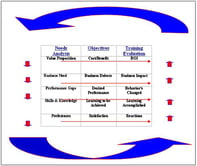Published on
The Experimental University (Part 2)

Starting Up
The Experimental University would start its operation by admitting a wide range of student demographics. Just as doctors want to understand the role of different treatments on all classes of patients, the ExU would want to ensure its teaching and learning discoveries apply to the vast majority of students.
Developing a Culture of Experimentation and Improvement
The ExU would be an experiment-rich and measurement-intensive institution. Students and faculty would all be engaged in constant data development and experiments (A/B testing) to make the learning process as efficient, reliable, humane, exciting and cost-effective as possible.
Like a first-class medical research institution, the Experimental University would combine practice with research. The ExU would use control groups to experiment with new ways of learning and to test existing learning theories to determine their validity. In addition, the ExU would examine institutions across society to discover practical learning tools applicable in a college or university setting.
The ExU would have an aggressive culture of improvement and creativity modeled on medical institutions like M.D. Anderson and the University of California, San Francisco, and companies such as Apple, Amazon, Google, 3M, and Toyota where innovation, creativity and annual productivity increases are built into the institutional DNA.
Approaches to Curriculum
The nation’s college teaching faculty now operate like British workers in the pre-industrial home-based textile industry. Tens of thousands of teachers work independently in their separate classrooms, with little coordination, serious quality control or economies of scale. As a result, our collegiate system is an inefficient collection of individual classroom fiefdoms.
Although courses tend to be developed by individual faculty, faculty are not trained to be course development experts, learning-theory specialists, experimenters, test creators or even good teachers. Instead, most are taught in college and graduate school to master an academic discipline. As a result, becoming a good teacher is typically an afterthought.
Then there is the issue of quality.
While many academics have opinions, no one in the country can say which college has the best or the worst math, writing, biology or economics courses or degree programs. No one has objective measures to identify the least or most effective faculty. Meaningful campus-to-campus comparisons of student learning are almost impossible, since virtually each faculty member teaches different courses in different ways. No one has reliable, hard measures of whether students in San Diego, Boston or Miami maximize their learning potential.
It need not be that way.
Following the example of the highly respected British Open University as well as several contemporary Massive Open Online Course (MOOC) developers, the Experimental University would create teams of faculty subject-matter experts, learning-theory and course-design specialists and testing gurus to develop a group of new and constantly evolving and improving core master courses. These expert-designed courses would test various theories of online and classroom-based teaching and learning.
Course Design Features
The ExU master courses would differ from most college courses in the following ways:
• They would be developed for online, classroom and hybrid delivery
• They would be developed to maximize free or inexpensive open-source textbooks and other learning materials.
• They would be constantly reviewed and upgraded by their development teams.
Course Composition
Every master course would be modularized or subdivided into discrete learning units. Modularizing all courses would permit easier experimentation, comparison and analysis. It would also allow quicker or slower students to pace themselves appropriately. For example, one student might zip through a math or language course while another flies through one in music or poetry. A third might need extra weeks to assimilate and practice mathematical concepts or reanalyze a novel.
The Test Bed
The ExU would continuously modify, incrementally improve and test each module for its effect on learning. As with new drugs that affect only patients with particular genes, it may be that students with specific academic preparation or particular behavioral or attitudinal tendencies would respond well and learn more effectively with specific types of learning modules.
Course Features
To increase student interest and involvement and make student learning more engaging and effective, the master courses would incorporate ExU research findings to:
• Articulate explicit learning objectives and competencies for each part of the course
• Test and validate putative best practices
• Integrate numerous long-term memory and understanding aids such as analogies and mnemonics
• Present numerous practical examples to describe how abstract material is used in the real world
• Include, where applicable, explanations by experts, practitioners and employers that explain how theoretical material is applied in the real world
• If appropriate, selectively integrate content with computer gaming, animation, art and music, as well as film and television film clips. For example, course creators might incorporate film, video, music, animation and gaming elements into courses to highlight essential or difficult-to-understand concepts that often baffle students
• Integrate evaluation and assessment of student competency in the learning objectives throughout the course material.
While many of these course features are currently in development, as with the newly emerging MOOCs, they are nowhere fully integrated into an institution whose purpose is to transform education with scientifically based best practices.
Overcoming Critical Academic Barriers/Applying Failure Analysis
One of the goals of the Experimental University would be to identify and overcome conceptual and analytic learning barriers in key courses, obstacles that typically trip up students and cause them to fail.
To increase learning and reduce failure, the ExU would create alternative learning strategies to assist students in mastering challenging material. For example, faculty and course developers will focus on developing new problem-solving procedures or algorithms that enhance student learning to aid failing math students who have great difficulty in mastering logarithmic functions, factoring techniques or exponential equations.
Crowdsourcing of helpful suggestions, along the lines of Linux or Innocentive, would be used to discover imaginative solutions from a worldwide pool of faculty and student volunteers.
Conclusion: The Transformational Contribution of An Experimental University
The Experimental University, once developed, would become a transformational institution with global impact.
The ExU’s goal would be to rigorously and imaginatively apply the scientific method, intuition and creativity we now use in medicine, engineering and other fields to the process and practice of higher education. The ExU’s mission would be to fundamentally understand how students learn and apply that understanding to significantly increase student success and graduation rates as well as institutional effectiveness. By accelerating and deepening student learning, the nation can improve the productivity of American higher education and dramatically increase opportunity and quality of life for millions of students, their families and their communities.
To read part one of this two-part series, click here.


